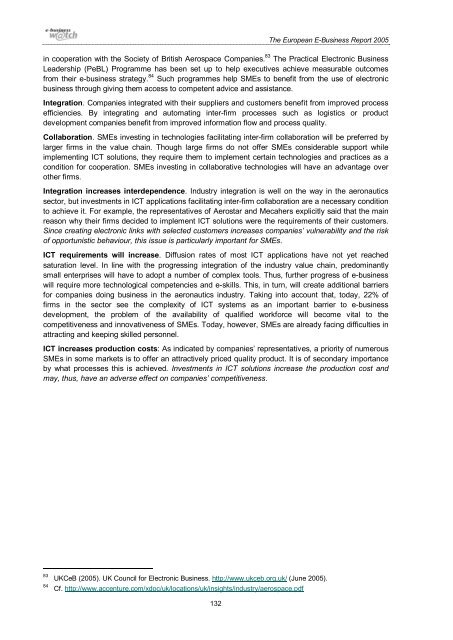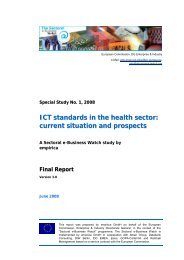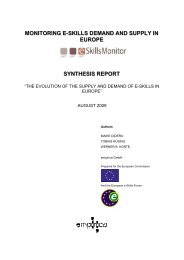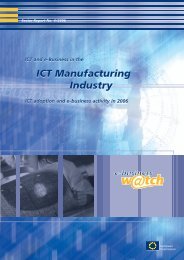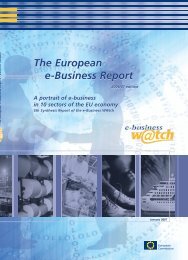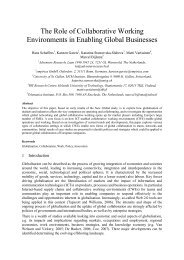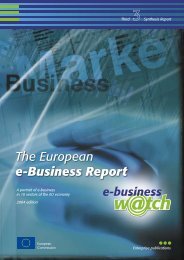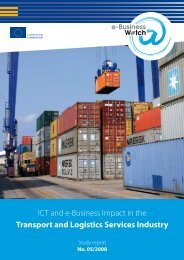The European e-Business Report The European e ... - empirica
The European e-Business Report The European e ... - empirica
The European e-Business Report The European e ... - empirica
You also want an ePaper? Increase the reach of your titles
YUMPU automatically turns print PDFs into web optimized ePapers that Google loves.
<strong>The</strong> <strong>European</strong> E-<strong>Business</strong> <strong>Report</strong> 2005<br />
in cooperation with the Society of British Aerospace Companies. 83 <strong>The</strong> Practical Electronic <strong>Business</strong><br />
Leadership (PeBL) Programme has been set up to help executives achieve measurable outcomes<br />
from their e-business strategy. 84 Such programmes help SMEs to benefit from the use of electronic<br />
business through giving them access to competent advice and assistance.<br />
Integration. Companies integrated with their suppliers and customers benefit from improved process<br />
efficiencies. By integrating and automating inter-firm processes such as logistics or product<br />
development companies benefit from improved information flow and process quality.<br />
Collaboration. SMEs investing in technologies facilitating inter-firm collaboration will be preferred by<br />
larger firms in the value chain. Though large firms do not offer SMEs considerable support while<br />
implementing ICT solutions, they require them to implement certain technologies and practices as a<br />
condition for cooperation. SMEs investing in collaborative technologies will have an advantage over<br />
other firms.<br />
Integration increases interdependence. Industry integration is well on the way in the aeronautics<br />
sector, but investments in ICT applications facilitating inter-firm collaboration are a necessary condition<br />
to achieve it. For example, the representatives of Aerostar and Mecahers explicitly said that the main<br />
reason why their firms decided to implement ICT solutions were the requirements of their customers.<br />
Since creating electronic links with selected customers increases companies’ vulnerability and the risk<br />
of opportunistic behaviour, this issue is particularly important for SMEs.<br />
ICT requirements will increase. Diffusion rates of most ICT applications have not yet reached<br />
saturation level. In line with the progressing integration of the industry value chain, predominantly<br />
small enterprises will have to adopt a number of complex tools. Thus, further progress of e-business<br />
will require more technological competencies and e-skills. This, in turn, will create additional barriers<br />
for companies doing business in the aeronautics industry. Taking into account that, today, 22% of<br />
firms in the sector see the complexity of ICT systems as an important barrier to e-business<br />
development, the problem of the availability of qualified workforce will become vital to the<br />
competitiveness and innovativeness of SMEs. Today, however, SMEs are already facing difficulties in<br />
attracting and keeping skilled personnel.<br />
ICT increases production costs: As indicated by companies’ representatives, a priority of numerous<br />
SMEs in some markets is to offer an attractively priced quality product. It is of secondary importance<br />
by what processes this is achieved. Investments in ICT solutions increase the production cost and<br />
may, thus, have an adverse effect on companies’ competitiveness.<br />
83<br />
84<br />
UKCeB (2005). UK Council for Electronic <strong>Business</strong>. http://www.ukceb.org.uk/ (June 2005).<br />
Cf. http://www.accenture.com/xdoc/uk/locations/uk/insights/industry/aerospace.pdf<br />
132


